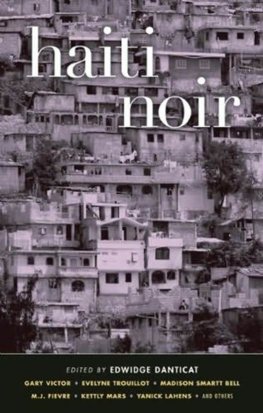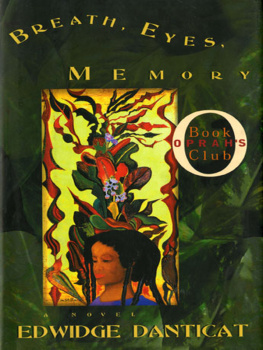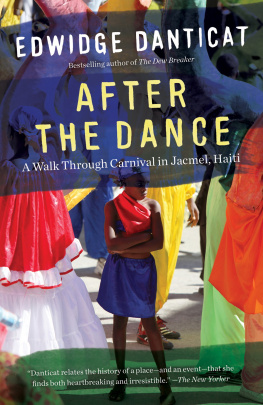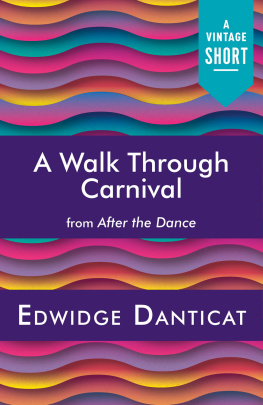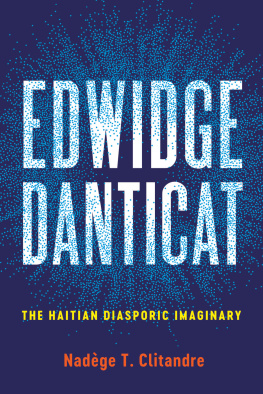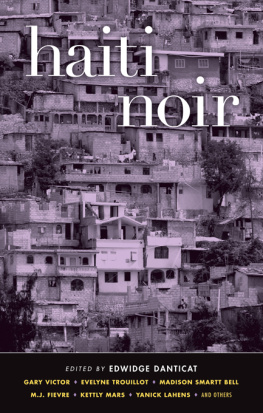HAITI NOIR
Edited bi Edwidge Danticat
Series concept by Tim McLoughlin and Johnny Temple
Haiti map by Aaron Petrovich
Twenty Dollars by Madison Smartt Bell 2011 by Madison Smartt Bell;
The Finger by Gary Victor was originally published in French as Le doigt, in Treize nouvelles vaudou (Mmoire dencrier, Montreal).

I began working on this anthology about a year before January 12, 2010, when Haiti was struck by its worst natural disaster in over two hundred years. The world knows now that more than two hundred thousand people died and over a million lost their homes in Haitis capital and the surrounding cities of Logne, Petit-Gove, and Jacmel. As I am writing these words, survivors remain huddled by the thousands in displacement camps, most shielding themselves from intermittent rain with nothing but wooden posts and bedsheets.
Even before the earthquake, life was not easy in Haiti. There was always the risk of dying from hunger, an infectious disease, a natural disaster, or a crime. But there was also hope, laughter, and boundless creativity. Haitian creativity has always been one of the countrys most identifiable survival traits. Whether expressed in vibrant and colorful paintings, double entendre-filled spiritual or party music, or the poignant, humorous, erotic, lyrical (and yes, also dark) short stories and novels of its writers, Haitis more nuanced and complex face often comes across in its arts.
When I began seeking submissions for this book, many of the writers I contacted, both inside and outside of Haiti, would comment on the suitability of the title Haiti Noir.
I know you inherited it from the series, one of them said, but it certainly is fitting.
Noir of course means-among other things-black, and Haiti became the first black republic in the Western Hemisphere when it was established by former slaves in 1804. Noir (nwa in Creole), as the scholar Jana Evans Braziel points out in her book Artists, Performers, and Black Masculinity in the Haitian Diaspora, also refers to any Haitian citizen, regardless of race. The founders of the republic designated it that way so that even the Polish soldiers who deserted the French to fight alongside Haitians during their battle for independence were considered noirs, while all other foreigners, of whatever race, were considered blancs (blan in Creole).
The irony of these designations struck me recently as I was rereading what I consider the most historically noir stories that link Haiti and the United States. The stories I am thinking of are those self-designated dark tales written by United States Marines who were stationed in the country during the American occupation that began in 1915 and ended in 1934. Over those nineteen years, Haiti was fertile ground for cannibal-and zombie-filled soldier memoirs and fear-provoking Hollywood B movies. Claiming to recount firsthand tales of woolly-headed cannibals, books such as Captain John Houston Craiges Black Bagdad and Cannibal Cousins, along with William Seabrooks The Magic Island and Richard Loederers Voodoo Fire in Haiti, shrouded Haiti in a kind of mystery that aimed to stereotype and dehumanize its people. I am certainly not one to censor any writer, but sentences like this one from Voodoo Fire in Haiti, send chills down my back:
Laugh at the negroes! You understand them as little as they understand you. The black race is far closer to the earth than the white, and for that reason they are happier than all the white men put together. A negro believes without asking why; he submits to nature.
This is as understanding as it gets, folks.
What these narratives prove, however, is something that the Haitian scholar and intellectual Jean Price-Mars-a peer of those men-had been trying to convince his fellow Haitian writers for some time, that Haitis own stories were worth telling.
Through a disconcerting paradox, he wrote in his seminal work, Ainsi parla loncle (So Spoke the Uncle),
these people who have had, if not the finest, at least the most binding, the most moving history of the world-that of the transplantation of a human race to a foreign soil under the worst biological conditions-these people feel an embarrassment barely concealed, indeed shame, in hearing of their distant past. It is those who during four centuries were the architects of black slavery because they had force and science at their service that magnified the enterprise by spreading the idea that Negroes were the scum of society, without history, without morality, without religion, who had to be infused by any manner whatsoever with new moral values, to be humanized anew.
Forget trying to rewrite the great works of French literature on which you had been raised, he exhorted the Haitian writers of his time. Turn to Haitian life and history and folklore and find your inspiration there.
Some of his contemporaries, and many among the generation that followed, took Price-Marss advice to heart. Ida Salomon Faubert, one of Haitis first published female writers, wrote of the countrys tropical nights from both Haiti and France, where she eventually made her home. The ethnologist/ poet/novelist Jacques Roumain placed his Langston Hughes- translated masterpiece Gouverneurs de la Rose (Masters of the Dew) in a peasant setting. Jacques Stephen Alexis, Haitis doctor/revolutionary/novelist, wrote about a massacre of cane workers in the Dominican Republic. Philippe Thoby-Marcelins The Beast of the Haitian Hills took a satirical look at peasant life and Vodou through the eyes of a grieving urban shopkeeper who moves to the countryside. One of the grande dames of Haitian letters, Marie Vieux-Chauvet, wrote her world-renowned novels and plays about, among other things, rural and urban oppression. And Haitian literature has continued to thrive ever since.
Many of the writers you will read here are part of the flourishing contemporary scene in Haitian literature, both in Haiti and in the Haitian diaspora, including France, Canada, and the United States. Migration is such an integral part of the Haitian experience that those living outside of the country were once designated as part of a tenth department, an ideological auxiliary to Haitis first geographical nine. Thats why this anthology includes writers from both inside and outside of Haiti, with two Haitiphile blan as well.
The writers range in age from early twenties to late sixties. Some are at the very beginning of their careers and are being published in book form for the first time. Others have been publishing in several genres for decades. However, only a handful might have considered themselves writers of noir (the mystery/detective kind) before this experience.
I can honestly say that, in spite of the difficult circumstances in Haiti right now, I have never felt a greater sense of joy working on any collective project than I have on this book. I dont want to summarize all the stories here because I want you, my dear reader, to experience the same sense of discovery I felt each time I picked one up and delved in. Seeing a book emerge before my eyes was truly a thrill and I have organized it here so that your experience somehow mirrors mine as the stories unfold. Each story is of course its own single treasure, but together they create a nuanced and complex view of Haiti and many of its neighborhoods and people.
I was nearly done with the collection when the earthquake happened on January 12, 2010, so I was afraid to reread the stories we had already selected, fearing that such a cataclysmic event, which has so reshaped Haitis physical and psychological landscape, would somehow render them all irrelevant. I was very glad to discover, upon reading them again, that this was not at all true. If anything, each story is now, on top of everything else, a kind of preservation corner, a snapshot of places that in some cases have been irreparably altered. (The fictional places, however, remain unchanged.)

